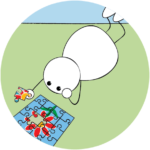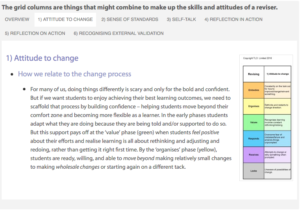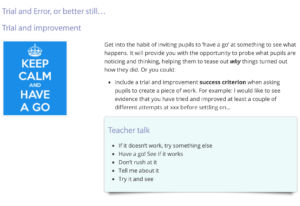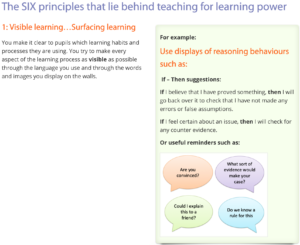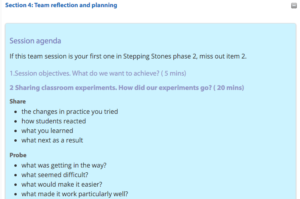The Phase 2 online learning programme in TLO’s Stepping Stones series consists of ten online units. Each unit is expected to take at least a month to put into practice. The units give easy to access information about one learning behaviour including suggestions for making classrooms learning friendly and plenty of activities to try out. Staff are thus armed with ideas to support their efforts to develop a learning friendly culture and apply a more forensic approach to learning. This in turn helps learners to build their own learning habits.
The effect of phase two Stepping Stones is to;
- deepen the learning positive culture the school established in phase 1
- step up the change process through learning teams
- strengthen the growing expertise across the school
- ensure a focus on a proven right track
- build pupils’ learning character across a broader range of behaviours.
How it works
The Stepping Stones Phase 2 consists of ten online sessions, which you can space out over a year, or more. The solid foundation and understanding the school established in Stepping Stones Phase 1 means that Phase 2 can move much more quickly and you can introduce a new learning habit into classrooms each month. You can also choose which order to do the sessions in, so teams can follow their own needs and ensure best fit with their pupils’ progress.
The units are about the learning habits of:
Plus a final unit on Reviewing practice
Each unit has four sections:
Section 1 The learning habit and how it develops.
- The learning habit and how it develops. The Progression Chart.
Section 1 introduces you what the learning behaviour is about and how it might progress or build through 5 phases. Participants are asked to plot where their pupils are now in being able to use the behaviour skilfully.
This section offers a concise way of getting to grips with the learning behaviour and how it progresses. It’s likely to take about 20 mins to get your head around it.
Section 2 Taking the learning habit into classroom culture
Taking the learning habit into classroom culture. Classroom activities. This section offers numerous suggestions to develop a friendly culture and build pupils’ learning skills.
Here you will find ideas for lesson starters/quick wins; classroom activities; learning reflection tools; ideas for the appropriate learning language for each phase progression in the learning habit. You are likely to browse in this section for about 30 minutes in preparation for the team meeting.
Section 3 Blending learning habits with content
- Blending questioning with content. Example dual focused lesson. This section suggests a series of questions and steps you might use to ensure the development of learning habits claims its place in the curriculum and is designed into lesson/activities to aid understanding.
Here we look closely at how to blend improving pupils’ learning habits into the content you have to teach. The section covers; The principles behind any learning powered lesson. Big questions to ask about lesson design. Lesson planning in action…an exemplar learning habit focused task
Section 4 Team reflection and planning
Each unit is accompanied by a Learning Diary This helps staff to distil important messages, home in on the key bits of information and design learning experiments specifically for their pupils.
Review and Renew day
The on-line programme can be packaged with a consultancy day to review your progress over Phase 1 and give renewed focus for moving into Phase 2, considering which modules might be best to visit first. No INSET required.
- Morning session with SLT including observations in classrooms, talking with children and taking soundings from staff. This session aims to review the impact of Stepping Stones Phase 1 on both teachers and learners. The afternoon session will be spent with the Professional Learning Team leaders to evaluate the rigour and effectiveness of the team sessions from Phase 1. The twilight session for all staff will feedback on their progress and give an overview of what they can expect in Phase 2.
This format does not require an in-service training day.
Free Preview



